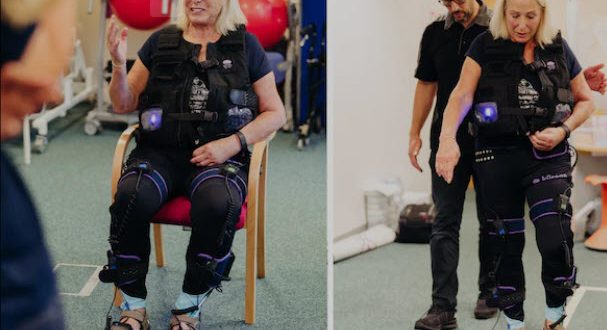While functional electrical stimulation (FES) has been a valuable tool in stroke rehab for decades now, advancements in tech are opening doors to more sophisticated and effective therapies. One such innovation is NeuroSkin from Kurage, an AI-powered neuroprosthesis designed to help stroke survivors regain their walking ability and independence.
NeuroSkin is a wearable FES system that integrates smart textile technology with artificial intelligence. Instead of manually applying electrodes, stroke survivors wear specialised garments, such as trousers, which have embedded dry electrodes and sensors. These sensors continuously monitor the user’s gait in real time. This data is then analysed by an AI processing unit, typically housed in a vest worn alongside the garment.
Based on its analysis of the individual’s movement patterns, the AI precisely times and delivers electrical stimulation to the specific muscle groups in the affected leg that need assistance. This helps to activate and strengthen those muscles, facilitating a more natural and symmetrical walking pattern.
The core benefit of NeuroSkin lies in its ability to provide personalised, real-time assistance during walking. Unlike traditional FES systems that often rely on pre-set stimulation patterns, NeuroSkin’s AI adapts to the individual’s unique gait, adjusting stimulation timing and intensity on the fly. This dynamic approach aims to encourage neuroplasticity and more effectively re-establish the connection between the brain’s intention to move and the actual muscle response.
In a retrospective multicenter feasibility study, stroke patients using NeuroSkin showed promising results, including statistically significant improvements in walking speed, endurance, balance and ambulation level. These improvements exceeded clinically meaningful thresholds, suggesting a substantial positive impact on the patient’s quality of life. The system’s excellent usability, rated highly by therapists in the study, further supports its potential for integration into routine rehabilitation.
As of late 2023, NeuroSkin is primarily accessible through specialised rehabilitation centres and clinical trials rather than being available for direct purchase by individuals. Access in the UK is typically through a leasing arrangement with clinics, with an estimated cost of around £5,000 per month. This cost usually includes the use of the device and associated therapy sessions under clinical
The integration of AI and wearable technology in FES, as exemplified by NeuroSkin, offers a significant advantage over conventional FES. By automating and personalising the stimulation process, it addresses key limitations of older FES devices, such as the need for manual electrode placement and parameter tuning. This allows therapists to focus more on guiding the rehabilitation process and supporting the patient, while the technology handles the intricate details of muscle stimulation.
The wearable nature of the system also paves the way for more intensive, home-based therapy, potentially maximising a stroke survivor’s recovery potential by allowing for consistent, high-quality training beyond the confines of the clinic. In essence, the point is to make stroke rehab more targeted, efficient and ultimately more effective in helping survivors regain crucial motor functions.



